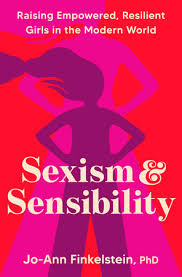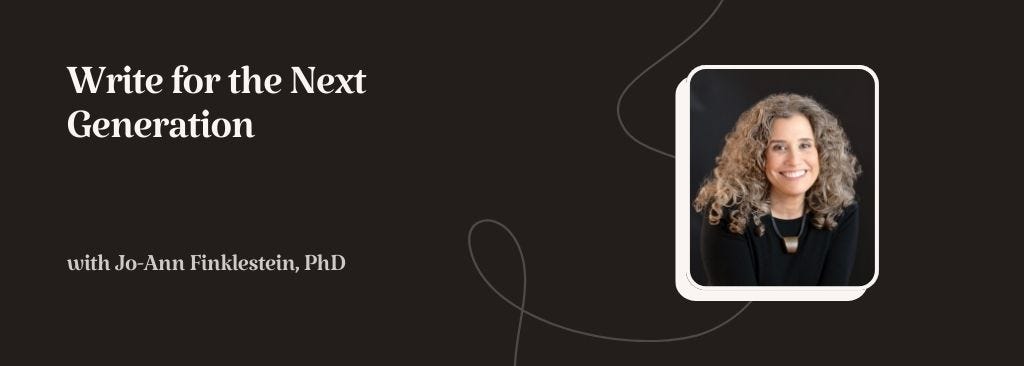The week before the election, I finished reading
’s groundbreaking book, Sexism & Sensibility: Raising Empowered, Resilient Girls in the Modern World. I started following Dr. Finkelstein’s work several months before the book was released, and I’d been anticipating it eagerly, not only as the mother of two teenage daughters, but as a voice teacher to adolescent girls, a creative writing instructor for midlife women, and producer of storytelling and comedy shows specifically by and for women.Amplifying the voices of girls and women—whether in actual adolescence or midlife (which I like to think of as a bonus adolescence with the gifts of wisdom and perspective as a consolation prize for perimenopause)—is my very favorite thing.
If I thought reading this book was timely in November 2024, well. Things have certainly not improved.
It’s Time To Talk About It
Dr. Finkelstein explains why it is so important that books like this exist and why we need to explore these topics, bringing them finally into the light: “By the time girls are forming a sense of self in the world, they can tell the playing field isn’t level, but that’s rarely made explicit for them.”
There is simply no way for me to encapsulate the tremendous resource this book is—you need to buy it and take copious notes. Knowing that a comprehensive review would make it impossible to rein in my verbosity, I decided to zoom in on one of my favorite aspects of Sexism & Sensibility: voice.
I devoured this book (carefully, with a highlighter, obviously), and while it is absolutely jam-packed with insight, social science, statistics, practical ideas, and sobering commentary on everything from body image, sex positivity, social media, rape culture, capitalism, porn, ambition, and gender stereotypes, it was the chapter on “finding her voice” that spoke to me the most. Because as a mother (and teacher, producer, and performer), voice is what I spend the most time emphasizing to my own children and all the girls and women I work with.
Of course, I appreciated the tips on how to actually teach this to girls—complete with a nod to the mic-drop Kamala Harris strategy: “I am speaking”—but I couldn’t tear my eyes away from the commentary of how we got to this place. I had to stop highlighting individual sentences and just started drawing a yellow line next to entire paragraphs.
Speaking of mic drops, one of the chapter’s sections is titled, “The Invisible Work of Girlhood: Performative Femininity.” Doesn’t that say so much, all on its own? Dr. Finkelstein references the invisible labor and mental load many adult women are all too familiar with, but then highlights the not-so-subtle programming girls receive very early on that lets us know we are responsible for managing everyone’s feelings. Essentially every woman in my creative writing groups has struggled to shake off this heavy yoke, and we all write about it with a nearly rabid sense of purging.
Dr. Finkelstein describes experiences so many of us can relate to: hiding the most genuine parts of ourselves out of necessity, being labeled overly sensitive and dramatic, and being talked out of our intuition.
Her description of what this feels like as a teenage girl made my throat ache with recognition:
“My own teen years were full of tiny missteps and long hours puzzling over the most artful way of declining requests or delicately sharing an accomplishment. From a young age, girls are expected to accommodate others and ensure they don’t hurt others’ feelings. And while empathy and cooperation are important for all children to learn, girls are pushed into unproductive ruminations that are distracting and anxiety provoking and that sap them of valuable mental and emotional energy.”
Writing Our Way Out
Every week when I read and workshop pieces of memoir and personal essay written by midlife women in my groups, we marvel at the similarities in themes. So many women are writing about marriages, divorces, and family of origin dynamics where they unconsciously carried burdens they never, ever wanted, leading up to the moment when they finally shrugged them off, Atlas style.
I find myself reading hungrily, desperate for the writer to lead me to the end of the path when they finally woke up and had their own Network-coded, “I’m mad as hell, and I’m not going to take it anymore!” moment and simply stopped. Stopped caretaking grown men, stopped silencing their own voices for the sake of preserving the status quo or protecting fragile male egos, and stopped allowing the gaslighting that told them this was acceptable.
Show us the way, I implore. We know you got out, but show us how. When did you stop doing this? How do we all learn it, and how do we teach it? Let’s return to our anthropological origins of basket emptying and meadow reports—those who have walked this path, please report back and teach us how we too can reclaim our voices and power and safety. Let’s tell the others; let’s teach the girls.
Another subsection of Sexism & Sensibility’s chapter on finding voice is called “Creating Space for Strong Voices,” and it made me want to rebrand my entire website with that message. Yes. If there is one thing I could do with this wild and precious life of mine, it would be to create safe spaces for strong female voices.
Every one of my voice students—from ages 9 to 15—gets a weekly earful from me about more than just healthy vocal technique. They hear me talk about confidence and taking up space, about honoring and allowing for their talent, sharing it without apology. We talk about taking the lid off our voices. We discuss that while we have been trained to keep our bodies small and quiet, instead, we practice noticeably filling our bellies with air—moving them as we sing—making ourselves big, our voices expansive.
Whether you are raising girls, or helping to raise granddaughters or nieces, neighbors or godchildren, we all have a duty to the next generation. And I believe Dr. Finkelstein is one of those voices that can be a lighthouse for us as we find our way through.
We are thrilled to be hosting a workshop with her on Thursday, April 3rd at 2 p.m.
Join us Thursday for "Write for the Next Generation."
In this engaging and thought-provoking workshop, Jo-Ann Finkelstein, PhD will explore some of the major biases discussed in her book, Sexism & Sensibility: Raising Empowered Resilient Girls in The Modern World. —and why addressing them with girls is crucial. While the book is written for parents, educators, and anyone who cares about or works with girls, this conversation goes beyond that. As women, we’ve all navigated a world where sexism has shaped our sense of self and what we believe is possible. And for those of us who write, create, or speak out, that influence can make us question whether our voices truly matter—especially in challenging times. By examining the forces that hold us back, we’ll uncover why women’s voices are not just necessary but urgent—to shift perspectives, challenge injustices, and shape the culture our children will inherit.
We'd love for you to join us for this important workshop and conversation.
Jo-Ann Finkelstein, PhD, is a clinical psychologist and the author of the acclaimed book Sexism & Sensibility: Raising Empowered, Resilient Girls in the Modern World. A graduate of the Harvard University, Graduate School of Education and Northwestern University, she now maintains a private clinical practice in Chicago, Illinois. Dr. Finkelstein’s insights have been highlighted in The New York Times, The Atlantic, Harvard Business Review, Oprah Daily, and CNN, among others.






I’m so excited to join The Herstories Project on Thursday and talk about why we need to keep writing!! Thank you for this incredible review of Sexism & Sensibility ❤️❤️
The link goes to a page that says the event is on January 9.